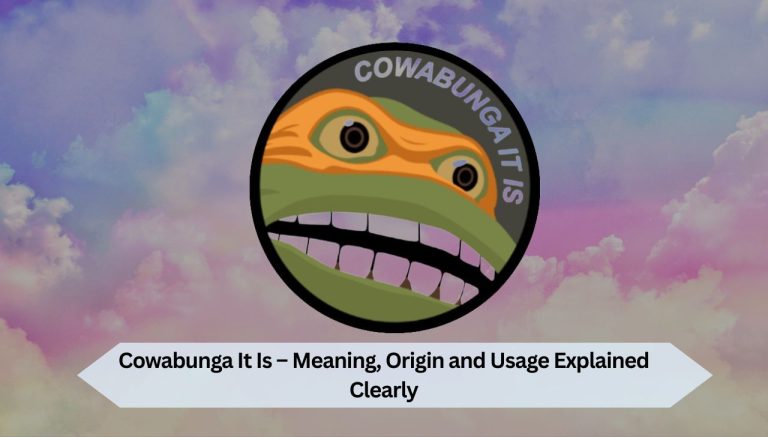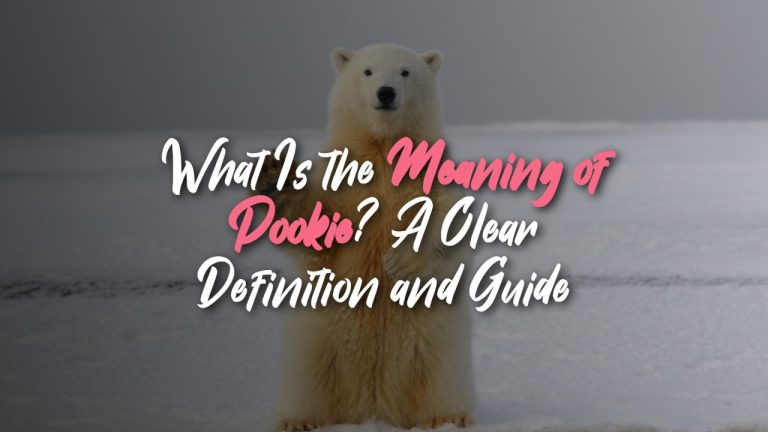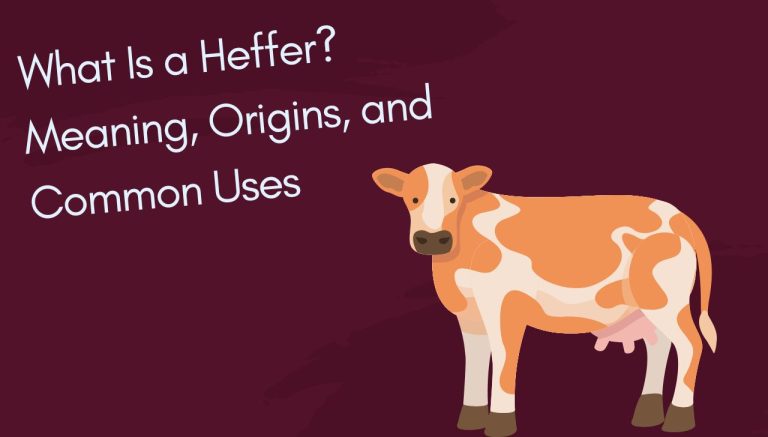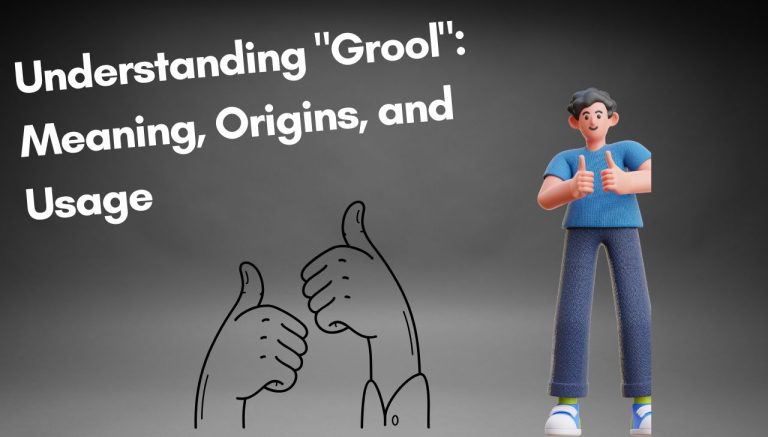The Bane of My Existence: What It Means and Why It Matters
Everyone has that one thing, right? That nagging little thorn in your side, that persistent annoyance, the person or problem that just won’t quit. Maybe it’s your unpredictable Wi-Fi, your neighbor’s 6 a.m. lawn mowing habit, or a coworker who insists on replying-all to every email. When people say, “That’s the bane of my existence,” they’re not being dramatic—well, maybe just a little—but they’re definitely expressing something real. This phrase isn’t just colorful language. It’s a snapshot of frustration, and it carries a surprisingly rich history and emotional weight.
So what exactly does it mean, and why has it stuck around in our everyday conversations? Let’s unravel this expression that has stood the test of time—and continues to show up in everything from novels to memes.
The Origins of “The Bane of My Existence”
The phrase might sound modern when used in casual banter, but its roots run deep. “Bane” comes from the Old English word bana, which originally meant “killer” or “slayer.” Back then, if something was your bane, it wasn’t just annoying—it could literally be fatal. Poison was often referred to as a “bane,” especially in phrases like “wolf’s bane” or “henbane,” which were actually toxic plants. Pretty grim, huh?
Fast-forward a few centuries, and while we’ve mostly dropped the life-or-death part, the intensity lingers. “Bane of my existence” evolved into a metaphorical way to describe anything that causes you ongoing misery or aggravation. The phrase became a staple in 19th-century literature, where characters would lament their fates or express frustration with societal pressures, lovers, or personal flaws.
Expand Your Knowledge : What Is a Heffer? Meaning, Origins, and Common Uses
Why “Bane of My Existence” Remains a Powerful Expression
So why does this phrase still hit home, even when we could just say “That’s really annoying” or “I hate that”? Honestly, it’s about drama—and a touch of humor. Language is emotional currency. “Bane of my existence” adds weight and flair to what might otherwise be a mundane complaint.
Let’s be real: nobody says, “My toddler waking me up at 4 a.m. is slightly bothersome.” No. It’s the bane of your existence. It captures the exhaustion, the helplessness, and, let’s admit it, the dark humor of daily life. There’s a reason this phrase has become a go-to in everything from comedy to Twitter rants. It turns everyday frustration into something almost noble.
And beyond the punch it packs, there’s something oddly comforting in naming your personal banes. Whether it’s procrastination, car trouble, or your inability to keep plants alive (guilty), putting a name to what drags you down can be a subtle act of taking back control. Language gives us a handle—something to grip when life feels slippery.
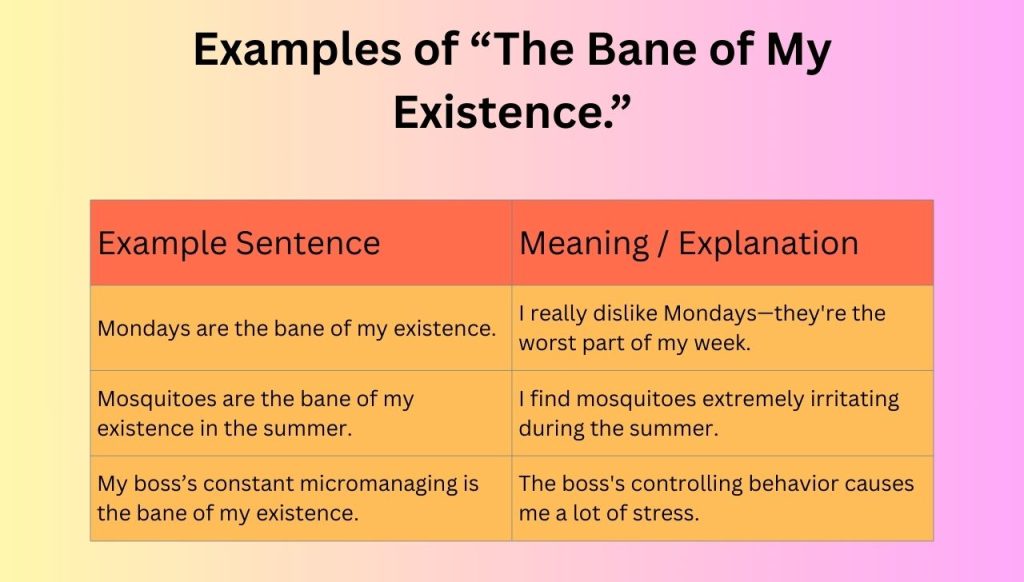
Examples of “The Bane of My Existence.”
| Example Sentence | Meaning / Explanation |
|---|---|
| Mondays are the bane of my existence. | I really dislike Mondays—they’re the worst part of my week. |
| Mosquitoes are the bane of my existence in the summer. | I find mosquitoes extremely irritating during the summer. |
| My boss’s constant micromanaging is the bane of my existence. | The boss’s controlling behavior causes me a lot of stress. |
| That slow internet connection is the bane of my existence. | The poor internet speed frustrates me greatly. |
| Homework used to be the bane of my existence in school. | I strongly disliked doing homework. |
| My allergies are the bane of my existence every spring. | Allergies make my life miserable during springtime. |
| That squeaky door is the bane of my existence. | The constant squeaking sound is very annoying. |
| My neighbor’s barking dog is the bane of my existence. | The dog’s constant barking bothers me a lot. |
| Trying to find matching socks is the bane of my existence. | I get irritated by how often I lose socks. |
| That one coworker who never listens is the bane of my existence. | Their behavior is constantly annoying and frustrating. |
| Traffic jams are the bane of my existence. | I hate getting stuck in traffic. |
| My phone’s battery dying so quickly is the bane of my existence. | I’m always frustrated by how fast my phone dies. |
| Cleaning the litter box is the bane of my existence. | I really hate doing that chore. |
| Group projects were the bane of my existence in college. | I found group assignments annoying or difficult. |
| That one computer error keeps popping up—it’s the bane of my existence. | The recurring error causes me ongoing stress. |
| The cold weather is the bane of my existence. | I strongly dislike being cold. |
| Having to make small talk is the bane of my existence. | I find small talk uncomfortable or tedious. |
| That clunky old printer is the bane of my existence. | The printer always causes issues when I try to use it. |
| Keeping up with emails is the bane of my existence. | Managing my inbox is overwhelming and unpleasant. |
| My teenager’s messy room is the bane of my existence. | The constant mess causes me ongoing frustration. |
Expand Your Knowledge : “Grand Rising: Meaning, Origins, and How It Impacts Your Day”
Conclusion
In the grand scheme of language, “the bane of my existence” might seem like a relic, a dusty phrase pulled from the past. But it’s not just hanging around for nostalgia’s sake—it’s useful, expressive, and a little theatrical, which, let’s be honest, we all need sometimes. It lets us dramatize the mundane, find solidarity in shared struggles, and laugh a little at the things that get under our skin.
So the next time you mutter, “Ugh, traffic is the bane of my existence,” take a moment. You’re tapping into centuries of human frustration—and a phrase that’s been sharpened by poets, authors, and regular folks alike. It’s a small way to vent, yes, but also to connect—to say, “This drives me up the wall,” with just the right touch of flair.

A former editor and grammar geek, David Langford has spent years refining the art of clear communication. He combines his journalism background with a knack for teaching, offering straightforward tips to master tricky grammar rules. When he’s not proofreading, he’s probably debating Oxford commas.


